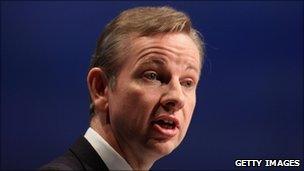Gove to tackle schools' 'no touch' rules
- Published

Michael Gove promised to "clarify and shrink" the guidance to teachers on school discipline
The myth that England's teachers are not allowed to touch pupils when they need to restrain or comfort them is to be tackled, the education secretary has said.
Michael Gove said the clarification was part of a "new deal" for teachers.
They would also be given some anonymity when facing allegations from pupils.
The National Union of Teachers (NUT) welcomed Mr Gove's comments, saying teachers needed clear rules on how to handle classroom indiscipline.
But the Children's Rights Alliance for England said giving school staff more powers could breach human rights and child protection laws.
There are no nationally imposed rules preventing teachers from touching pupils but some schools adopt a "no touch" policy because they fear complaints from pupils who are restrained or comforted by teachers.
Mr Gove said the current system in England was too complicated and promised to change the rules on school discipline.
He said: "At the moment if you want to become au fait with what this department thinks on how to keep order in class you have to read the equivalent of War and Peace.
"There are about 500 pages of guidance on discipline and another 500 pages on bullying. We will clarify and shrink that."
Right to search
Mr Gove added: "Teachers worry that if they assert a degree of discipline, one determined maverick pupil will say 'I know my rights' and so teachers become reticent about asserting themselves.
"There are a number of schools that have 'no touch' policies and we are going to make clear this rule does not apply."
The education secretary said he did not believe staff should be able to hit children.
But he added: "I do believe that teachers need to know they can physically restrain children, they can interpose themselves between two children that may be causing trouble, and they can remove them from the classroom."
Teachers should be able to console all victims of bullying, he said.
They would also be given the right to search pupils for "anything that is banned by the school rules".
He added: "The important thing is that teachers know that they are in control and that this department and the justice system will back them."
NUT general secretary Christine Blowers said: "We welcome the fact that Michael Gove is explicit that this is not a return to corporal punishment.
"Clearing up any grey areas regarding physical intervention would be welcome as clearly there are times when teachers need to intervene between pupils to prevent harm to themselves or others."
'Dangerous move'
But Children's Rights Alliance spokeswoman Carolyne Willow warned: "Giving even more powers to school staff to restrain children is a dangerous move that could contaminate schools and risks breaching human rights and child protection laws."
She said the priority should be making lessons "more simulating and engaging for all" and added: "Many schools are finding that adopting human rights values, with an emphasis on listening to children and young people and responding to their ideas and interests, bring great change."
Mr Gove also vowed to reduce the timescale within which allegations against teachers had to be investigated, as well as granting accused teachers anonymity while inquiries were ongoing.
The move is likely to find favour with teaching unions such as the NAS/UWT, which have complained in the past that teachers who are the subject of false allegations become the victims of a public "witch hunt" while they are investigated.
But Ms Willow said giving teachers anonymity fed "the myth that schools are being swamped with malicious allegations" from children and parents when that was not the case.
"Of course teachers like any other group have the right to fair treatment and due process, but let's have a balanced debate and not one that starts off with children as the problem," she said.
Retired secondary school teacher Vivienne Rendall, from Northumberland, contacted the BBC News website with her views.
'Words not enough'
She said: "At last, some common sense. I was a teacher and it went against the grain, not to be able to comfort a child.
"There are also times when you need to restrain children. I was a secondary school teacher and I once spent a whole 20-minute break with my arms wrapped round a 12-year-old boy who wanted to attack another boy. In the end he calmed down but it seemed the only possible thing to do.
"It just makes sense to be able to restrain and comfort children as words don't always prove to be effective."
Mr Gove's interview with the Guardian comes ahead of the Conservative Party conference in Birmingham, which started on Sunday.
- Published10 August 2010
- Published7 July 2010